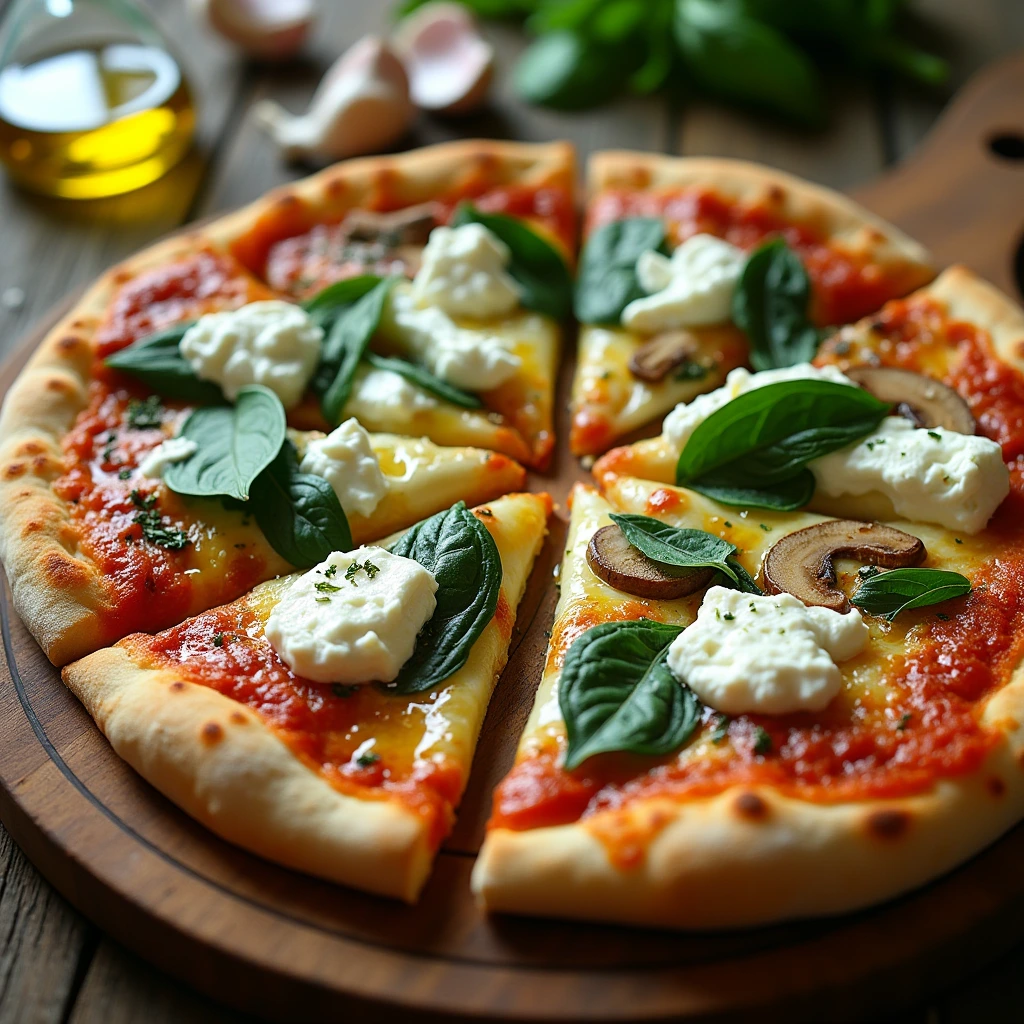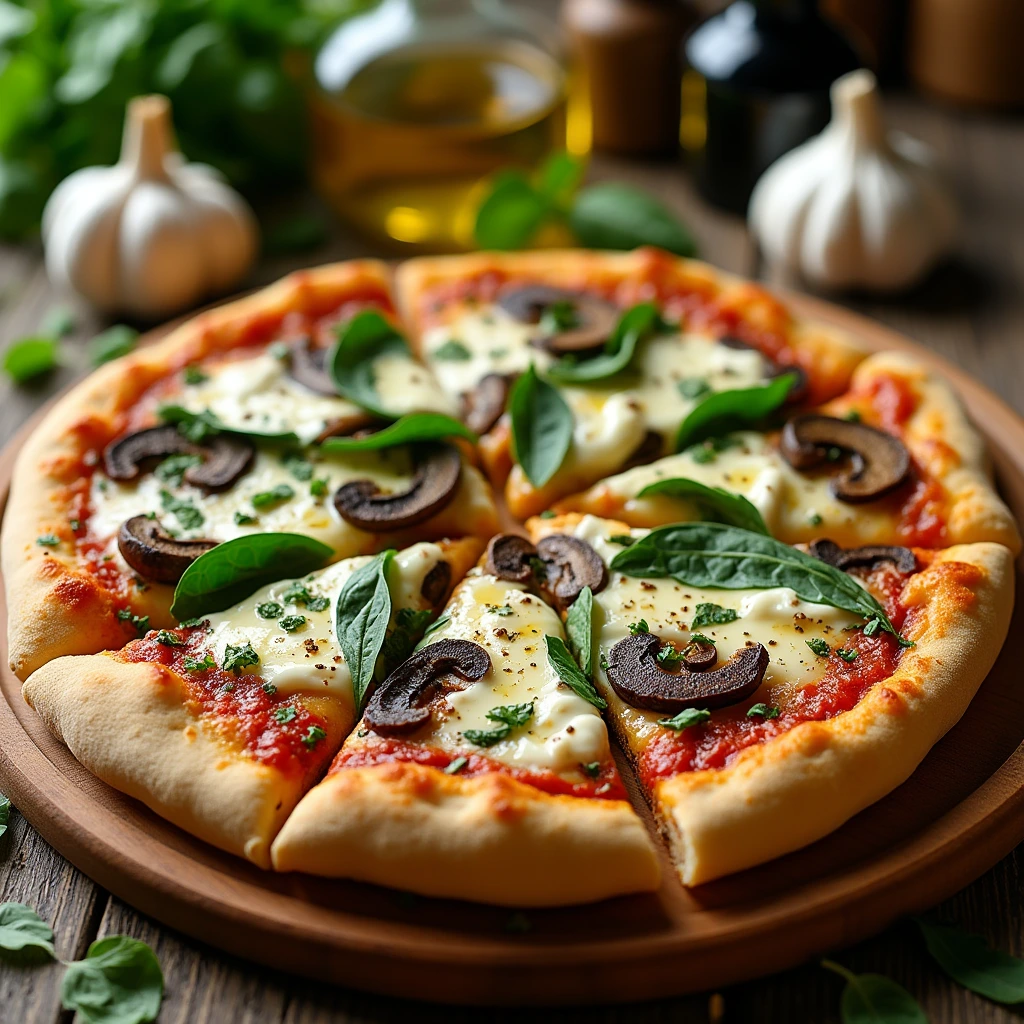What is Ricotta Pizza?
Ricotta pizza is a delicious variation of traditional pizza that features creamy ricotta cheese as a key ingredient. Unlike mozzarella-topped pizzas, ricotta adds a soft, velvety texture and a mild, slightly sweet flavor. This fresh cheese, made from whey, typically comes from cow’s, sheep’s, or goat’s milk.

The beauty of ricotta pizza lies in its versatility. It works well with white pizzas (without tomato sauce) or classic red sauce versions. Popular toppings include spinach, garlic, caramelized onions, and mushrooms. For a gourmet twist, ingredients like honey or figs also pair beautifully with ricotta.
This pizza style offers a creamy, indulgent twist on the classic pie. It appeals to food lovers seeking both simplicity and sophistication. Whether baked in a wood-fired oven for a crispy crust or prepared at home, ricotta pizza is sure to impress.
Why Ricotta is Perfect for Pizza
Health Benefits of Ricotta Cheese
Ricotta cheese is not only delicious but also a healthier choice compared to many other cheeses. It is low in fat and calories, making it a lighter alternative for pizza toppings. Ricotta is also rich in protein, which helps with muscle repair and keeps you feeling full. Additionally, it contains calcium and phosphorus, essential for maintaining strong bones and teeth. Its lower sodium content makes it a heart-friendly option compared to saltier cheeses like feta or cheddar.
How Ricotta Enhances Pizza Flavor
Ricotta cheese brings a unique creaminess to pizza that sets it apart. Its mild, slightly sweet flavor balances savory toppings like garlic, spinach, and mushrooms. Unlike heavier cheeses, ricotta has a light texture that doesn’t overwhelm the crust or other ingredients. It blends beautifully with both white and tomato-based sauces, creating a smooth, luxurious bite every time.
Ricotta also works well with gourmet toppings. Pair it with honey, figs, or prosciutto for a sweet-and-savory twist. Whether you prefer a simple pizza or something more creative, ricotta adds a fresh, indulgent quality that elevates every slice.
Types
1. Classic Ricotta and Spinach Pizza
This timeless combination pairs creamy ricotta cheese with fresh spinach. The mild sweetness of ricotta perfectly complements the earthy flavor of spinach, creating a balanced and satisfying bite. As a result, it’s a go-to option for both vegetarians and pizza lovers.
2. Ricotta Margherita Pizza
A twist on the classic Margherita, this pizza features ricotta instead of mozzarella. With fresh tomatoes, fragrant basil, and a drizzle of olive oil, it delivers a light yet flavorful experience. Therefore, it’s perfect for those who enjoy simplicity with a creamy touch.
3. White Ricotta Garlic Pizza
This pizza skips the tomato sauce, allowing ricotta to take center stage. Combined with roasted garlic, olive oil, and herbs, it creates a rich, savory flavor. Furthermore, the creamy ricotta provides a perfect balance to the robust garlic notes.
4. Ricotta Mushroom Pizza
Earthy mushrooms paired with ricotta make this pizza both hearty and indulgent. The smooth texture of ricotta enhances the umami-rich mushrooms. Consequently, it’s an ideal choice for anyone craving a more substantial vegetarian option.
5. Sweet Ricotta Dessert Pizza
Ricotta’s versatility truly shines in this dessert pizza. Topped with honey, figs, or fresh berries, and finished with a dusting of powdered sugar, it becomes a delightful treat. Thus, it’s a perfect way to end any meal on a sweet note.
How to Make it
Ingredients Needed for Ricotta Pizza
- 1 pizza dough (store-bought or homemade)
- 1 cup ricotta cheese
- 1 tablespoon olive oil
- 1-2 garlic cloves, minced (optional)
- 1/2 cup shredded mozzarella cheese
- Salt, pepper, and Italian herbs to taste
- Optional toppings: spinach, mushrooms, cherry tomatoes, or honey
Step-by-Step Recipe Instructions
- Preheat the oven: First, heat your oven to 475°F (245°C) or as hot as it safely allows. Additionally, place a pizza stone or baking sheet inside to preheat.
- Prepare the dough: Next, roll out your pizza dough on a floured surface until it’s thin and even. This step ensures the crust cooks evenly.
- Assemble the pizza: Then, spread ricotta cheese evenly over the dough. Drizzle with olive oil and add minced garlic if desired. After that, sprinkle shredded mozzarella and season with salt, pepper, and Italian herbs. You can also add optional toppings like spinach or mushrooms.
- Bake the pizza: Carefully transfer the pizza to the preheated stone or baking sheet. As a result, it will bake evenly. Bake for 8-12 minutes until the crust turns golden and crisp.
- Finish and serve: Finally, let the pizza cool slightly, slice it, and enjoy!
Tips for the Perfect Ricotta Pizza Crust
- For a crispy crust, always use a hot oven.
- Additionally, brushing olive oil on the edges gives a golden color.
- Most importantly, avoid overloading with toppings to prevent a soggy base.
Best Toppings
Vegetables That Pair Well with Ricotta
Ricotta pairs beautifully with a variety of vegetables, enhancing its creamy texture. Spinach and kale are classic choices, offering a fresh, earthy flavor. Additionally, roasted garlic, caramelized onions, and mushrooms add depth and richness. For a vibrant touch, cherry tomatoes, zucchini, or bell peppers work well, while artichokes and eggplant provide a Mediterranean twist.
Meat Options for Ricotta Pizza
If you prefer a meat-based pizza, several options complement ricotta’s mild, creamy taste. Crispy prosciutto adds a salty, savory contrast, while Italian sausage delivers a hearty, flavorful bite. You can also use pancetta for a subtle richness or pepperoni for a classic option. For a gourmet touch, shredded chicken or thinly sliced salami works exceptionally well.
Herbs and Seasonings to Complement Ricotta
Herbs and seasonings elevate the flavors of ricotta pizza. Fresh basil and oregano are perfect for adding an aromatic, Italian-inspired touch. Additionally, thyme, rosemary, or parsley brings freshness and balance. For seasoning, a pinch of crushed red pepper flakes, black pepper, or garlic powder adds subtle heat and flavor. Finally, a drizzle of olive oil or honey enhances the overall taste beautifully.
Vegan and Gluten-Free Options
How to Make Vegan Ricotta Pizza
To make a vegan ricotta pizza, start by preparing or buying dairy-free ricotta. You can make it at home using blended tofu, soaked cashews, lemon juice, nutritional yeast, and a pinch of salt. This mixture creates a creamy, ricotta-like texture and flavor.
For toppings, use vegetables like spinach, mushrooms, cherry tomatoes, or roasted garlic, as they pair perfectly with vegan ricotta. Drizzle olive oil and sprinkle Italian herbs for added flavor. Finally, bake your pizza with a plant-based crust and enjoy a satisfying, dairy-free alternative!
Gluten-Free Crust Options for Ricotta Pizza
There are several gluten-free crust options for ricotta pizza. Pre-made gluten-free pizza crusts, available at most stores, save time and effort. Alternatively, you can make your own crust using gluten-free flour blends, almond flour, or cauliflower.
For a unique twist, try a chickpea flour crust (socca), which is naturally gluten-free and protein-rich. If you prefer something light, zucchini or sweet potato crusts also work well. Just ensure the crust is baked until crispy before adding ricotta and toppings.
With vegan cheese and gluten-free crust options, ricotta pizza can be adapted to suit everyone’s dietary preferences!
Tips for Baking Ricotta Pizza
Choosing the Right Oven Temperature
The right oven temperature is crucial for achieving a perfect ricotta pizza. Always preheat your oven to at least 475°F (245°C), or as high as it safely allows. High heat ensures a crispy crust while keeping the ricotta creamy and smooth. If you have a pizza stone or steel, preheat it for at least 30 minutes to create an evenly cooked base. For home ovens without a stone, a preheated baking sheet works well.
Common Mistakes to Avoid When Baking Pizza
- Skipping Preheating: Failing to preheat the oven or stone results in a soggy crust and uneven cooking.
- Overloading Toppings: Adding too many toppings, especially wet vegetables, can make the crust soggy. Always pre-cook watery vegetables like spinach or mushrooms to remove excess moisture.
- Using Cold Dough: Pizza dough should be at room temperature before stretching. Cold dough is harder to work with and won’t bake evenly.
- Overbaking the Ricotta: Ricotta can dry out if overbaked. Add it in dollops rather than spreading it heavily, and bake just until the crust is golden.
- Neglecting the Edges: Brush the crust edges with olive oil for a golden, crispy finish.
By following these tips, you’ll bake a ricotta pizza that’s crisp, flavorful, and perfectly creamy.
Popular Ricotta Pizza Recipes
Ricotta and Spinach Recipe
Start with a thin pizza crust. Spread a layer of ricotta cheese evenly over the dough. Add pre-cooked spinach (sautéed with garlic and olive oil) for a fresh, earthy flavor. Sprinkle shredded mozzarella, salt, pepper, and a pinch of nutmeg for extra depth. Bake at 475°F (245°C) for 10-12 minutes until the crust is golden. Finish with a drizzle of olive oil for a vibrant touch.
Ricotta and Mushroom Recipe
Spread ricotta cheese over the pizza dough, leaving space for the crust. Top with sautéed mushrooms cooked with garlic, thyme, and a splash of olive oil. Add shredded mozzarella and season with salt, pepper, and Italian herbs. Bake at 475°F for 10-12 minutes. Once baked, garnish with fresh parsley or a light sprinkle of Parmesan for a savory, umami-packed pizza.
Sweet Ricotta with Honey Recipe
For a dessert twist, spread ricotta cheese over the crust. Top with sliced figs, fresh berries, or thinly sliced pears. Bake at 450°F (232°C) for 8-10 minutes until the edges are golden. Drizzle with honey and sprinkle powdered sugar for a sweet, creamy treat that’s perfect for any occasion.
Nutritional Value of Ricotta Pizza
Calorie Breakdown Per Slice
The calorie content of ricotta pizza varies based on toppings and crust. On average, a slice of ricotta pizza (with standard dough, ricotta, and light toppings) contains approximately 200-250 calories. The crust contributes most of the calories, while ricotta adds a moderate amount due to its creamy texture. Adding vegetables like spinach or mushrooms keeps calories low, while meats like sausage or pepperoni increase the total count.
Protein and Healthy Fats Content
Ricotta cheese is an excellent source of protein and healthy fats. A single slice of ricotta pizza provides about 8-10 grams of protein, depending on the portion of ricotta and additional toppings like mozzarella or meats. This protein helps with muscle repair and keeps you feeling full longer.
Additionally, ricotta contains healthy fats that are lower in saturated fat compared to many other cheeses. It also provides beneficial nutrients such as calcium, phosphorus, and vitamin A, which support bone and immune health. When paired with whole-grain or gluten-free crust options, ricotta pizza becomes a balanced meal that offers both flavor and nutrition.
By carefully choosing toppings and portion sizes, ricotta pizza can be a delicious, satisfying, and nutritious choice.
FAQs
Is ricotta good on pizza?
Yes, ricotta is an excellent choice for pizza. Its creamy, mild flavor adds a unique twist, balancing both savory and sweet toppings. Unlike heavier cheeses, ricotta feels light while adding richness, making it perfect for a variety of pizza styles.
Does ricotta melt well?
Ricotta does not melt like mozzarella or cheddar. Instead, it softens and becomes creamier when heated. This quality makes it ideal for dolloping onto pizza, where it retains its smooth, fluffy texture after baking.
What is a New York white pizza?
A New York white pizza skips the traditional tomato sauce and uses a base of ricotta, mozzarella, and Parmesan cheeses. Garlic, olive oil, and herbs like oregano or basil are often added for flavor. This creamy, cheese-forward pizza is a staple in New York pizzerias.
What is a grandma pizza?
A grandma pizza is a rectangular, thin-crust pizza that originated in Long Island, New York. It’s baked in a sheet pan and traditionally topped with tomato sauce, mozzarella, and olive oil. The crust is crispy on the edges yet soft in the center, resembling a homemade, rustic pizza.
Additional Resources
To further enhance your ricotta pizza experience, here are some useful external links with recipes, tips, and inspiration:
- Homemade Ricotta Cheese: Making fresh ricotta at home can elevate your pizza to the next level. Learn how to prepare creamy, homemade ricotta with this easy guide: How to Make Ricotta Cheese.
- Perfect Pizza Dough: The foundation of a great ricotta pizza lies in its crust. Check out this step-by-step tutorial for a foolproof pizza dough recipe: Easy Pizza Dough Recipe.
- Vegan Ricotta Alternatives: If you’re looking for dairy-free options, explore this simple vegan ricotta recipe made from cashews or tofu: Vegan Ricotta Cheese Recipe.
- Gluten-Free Crust Options: For those following a gluten-free diet, this guide to gluten-free pizza crusts offers several delicious alternatives: Gluten-Free Pizza Crust Recipes.
- Creative Ricotta Pizza Recipes: Explore more variations of ricotta pizza, including unique toppings and flavor combinations: Ricotta Pizza Recipes.
These resources will help you experiment with ricotta pizza, from homemade cheese and dough to gluten-free and vegan alternatives. Whether you’re a beginner or an experienced home chef, these links provide everything you need to create the perfect ricotta pizza at home. Enjoy exploring and enhancing your pizza-making skills!
You can discover more recipes on our website:
Final Thoughts on Ricotta Pizza
Ricotta pizza is a versatile and delicious option that offers a unique twist on traditional pizza. Its creamy texture and mild, slightly sweet flavor make it a perfect base for both savory and sweet toppings. Whether paired with fresh vegetables like spinach and mushrooms, savory meats like prosciutto or sausage, or even sweet additions like honey and figs, ricotta enhances every bite.
Beyond its flavor, ricotta also brings nutritional benefits, offering a good balance of protein and healthy fats while being lower in sodium compared to other cheeses. This makes it a lighter yet satisfying option for pizza lovers looking for something indulgent but not overly heavy.
With its adaptability to vegan and gluten-free options, ricotta pizza can cater to a variety of dietary preferences. By mastering a crispy crust, choosing the right toppings, and following simple baking tips, anyone can create a perfect ricotta pizza at home.
In short, ricotta pizza combines simplicity, flavor, and sophistication, making it an excellent choice for any meal, from weeknight dinners to special occasions. Enjoy experimenting with toppings and savor the creamy, delicious experience that ricotta pizza offers!

